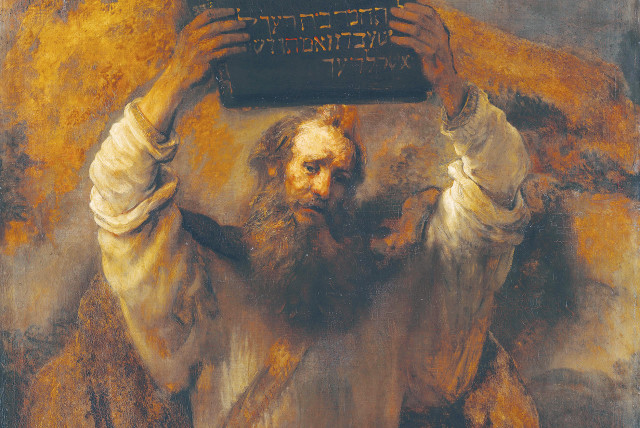Did the biblical prophet Moses promise his firstborn son to idolatry?

In a Midrash, Jethro tells Moses: “Your first child should be for idol worship, from here onwards,” – referring to subsequent children – “they will be for the sake of Heaven.”
In an unexpected passage in the Midrash, the sages recount a deal struck between Moses and his future father-in-law, Jethro. Moses had already decided to serve God when he came to Jethro to ask for Zipporah’s hand in marriage. Before giving his blessing, Jethro asks Moses for one undertaking.
“What is it?” inquired Moses.
Jethro explains: “Your first child should be for idol worship, from here onwards,” – referring to subsequent children – “they will be for the sake of Heaven.”
Jethro’s request was strange, but considering he was a priest of Midian (Exodus 2:16, 3:1, 18:1) we might expect that he wanted his grandchildren to follow in his footsteps. What is startling about this episode is that according to the sages, Moses accepted the terms of the agreement!
Jethro wanted to make sure that Moses kept his word, so he made his prospective son-in-law take an oath.
The passage in the Midrash concludes by connecting this exchange to the fact that one of Moses’ sons was uncircumcised – presumably because he was consecrated for idolatry, rather than destined for a Jewish life. A messenger from God was sent to take Moses’ life as punishment for the deal, but Zipporah intervened by circumcising her son, thereby giving the boy a Jewish identity and saving her husband’s life (Mekhilta DeRabbi Yishmael).
IT IS truly incongruous to think that Moses – faithful emissary of the Almighty and hero of the Jewish People – would agree to consecrate his first child to idolatry. Indeed, later midrashic compilations and commentators tweaked the passage to depict Moses as an unwilling accomplice, forced to acquiesce to the deal (Midrash Sekhel Tov; Tur) who earnestly tried to avoid fulfilling his side of the bargain (The Legends of the Jews).
How did hassidim reconcile the Midrash about Moses promising his firstborn to serve in idols?
One hassidic master could not accept the absurd notion that Moses would agree to such a deal, even under duress.
Rabbi Yitzhak Meir Alter (originally Rothenberg; 1799-1866), known by the title of multi-volume commentary on the Talmud and Shulhan Arukh, Hiddushei Harim, was the founder of Ger Hassidism. This hassidic group thrives today and is an active force in Israeli politics. The Hiddushei Harim simply refused to accept the Midrash at face value. The record of his response describes him as stretching out his arm demonstratively and offering a handshake, as he declared: “I am willing to guarantee that the matter was not so. And I will not play favorites with the Midrash, as if it was as per its literal meaning.”
Having rejected the plain meaning of the Midrash, the Hiddushei Harim set about offering an alternative reading for the words of the Sages: Jethro had already forsaken his idolatrous ways before he met Moses. He had investigated every religious path and come to the conclusion that God was greater than every other deity.
Yet Jethro felt that the only way to reach this understanding was by fully studying, examining, and perhaps even sampling all religions. Only this religious journey guaranteed a deep grasp of God’s singularity.
In Jethro’s eyes, such intellectual comprehension was better than an inherited belief. He, therefore, asked Moses that his first grandchild follow the same path that he had traveled – sampling all religions in order to attain an understanding of God that was based on research and knowledge. Moses agreed.
Thus both Jethro and Moses never considered actually dedicating a child to idol worship. Jethro’s request and Moses’ consent focused on the path to knowing God.
Lest someone try to adopt the path – a path proposed by Jethro and approved by Moses – the Hiddushei Harim preempts that possibility by contextualizing Jethro’s request and Moses’ cooperation. This path was ideal before the giving of the Torah. Indeed, from the Creation of the world there were pious people who recognized God: Adam, Noah, Abraham, Isaac, and Jacob. Yet, once the Torah was given to the Jewish people, no philosophical inquiry or Jethro-like wisdom was needed. All that is needed is to follow its directives.
WHILE THIS reaction is not recorded in the Hiddushei Harim’s own writings, it is repeatedly reported by his contemporaries and in later hassidic works. The earliest record appears to be the fascinating work of Rabbi Shmuel of Sieniawa (1785-1873) – a collection of hassidic teachings and tales styled as a commentary on the aggadic Tanna DeVei Eliyahu and titled Ramatayim Tzofim (Warsaw 1881).
Rabbi Shmuel of Sieniawa recorded the Hiddushei Harim’s teaching twice. In the first instance, he added a postscript to the latter’s interpretation, in order to buttress its reliability.
“And my testimony is faithful because when our master, our teacher, our rabbi the holy rabbi of the holy community of Ger said these things, we saw that his entire holy soul almost expired... from the extent of the fire that burned inside of him, the fire of God, fortunate is the eye that saw...”
In the second instance, he made it even clearer that he had been an eyewitness to the teaching:
“And thus I heard from the mouth of our master, our teacher, our rabbi, the holy rabbi, our teacher Harim of blessed memory from Ger, at the Friday night meal as he was excited with burning flame from heaven.”
In addition to the eyewitness report of Rabbi Shmuel of Sieniawa, others from the circle of Ger Hasidism as well as the Hiddushei Harim’s saintly descendants reported the teaching as well.
For the Hiddushei Harim and those who followed in his wake, a creative reading of the Midrash was more plausible than the notion that Moses, the hero of Jewish tradition, could even countenance the possibility of raising a child in a path that was not for the sake of Heaven.
The writer is senior faculty at the Pardes Institute of Jewish Studies and is a rabbi in Tzur Hadassah.
Jerusalem Post Store
`; document.getElementById("linkPremium").innerHTML = cont; var divWithLink = document.getElementById("premium-link"); if (divWithLink !== null && divWithLink !== 'undefined') { divWithLink.style.border = "solid 1px #cb0f3e"; divWithLink.style.textAlign = "center"; divWithLink.style.marginBottom = "15px"; divWithLink.style.marginTop = "15px"; divWithLink.style.width = "100%"; divWithLink.style.backgroundColor = "#122952"; divWithLink.style.color = "#ffffff"; divWithLink.style.lineHeight = "1.5"; } } (function (v, i) { });

